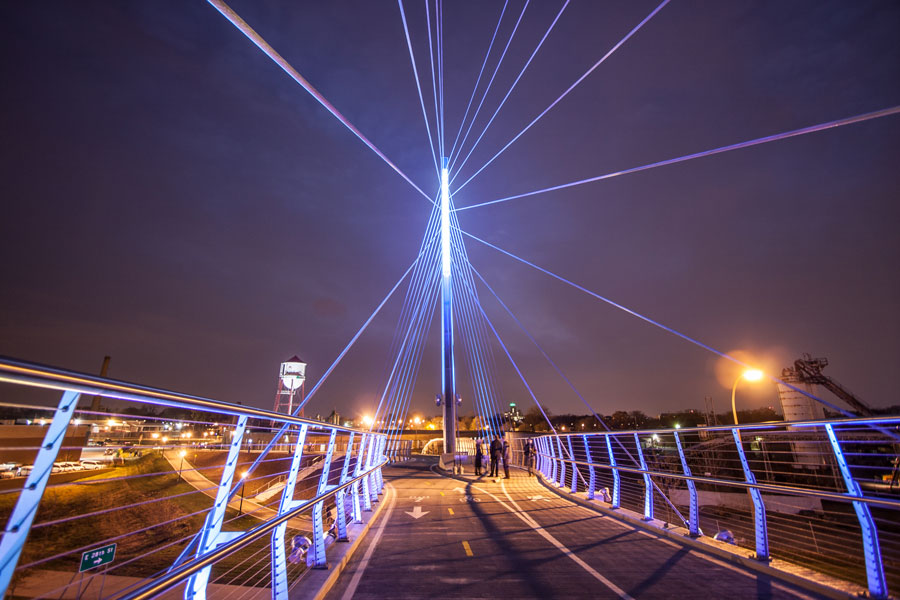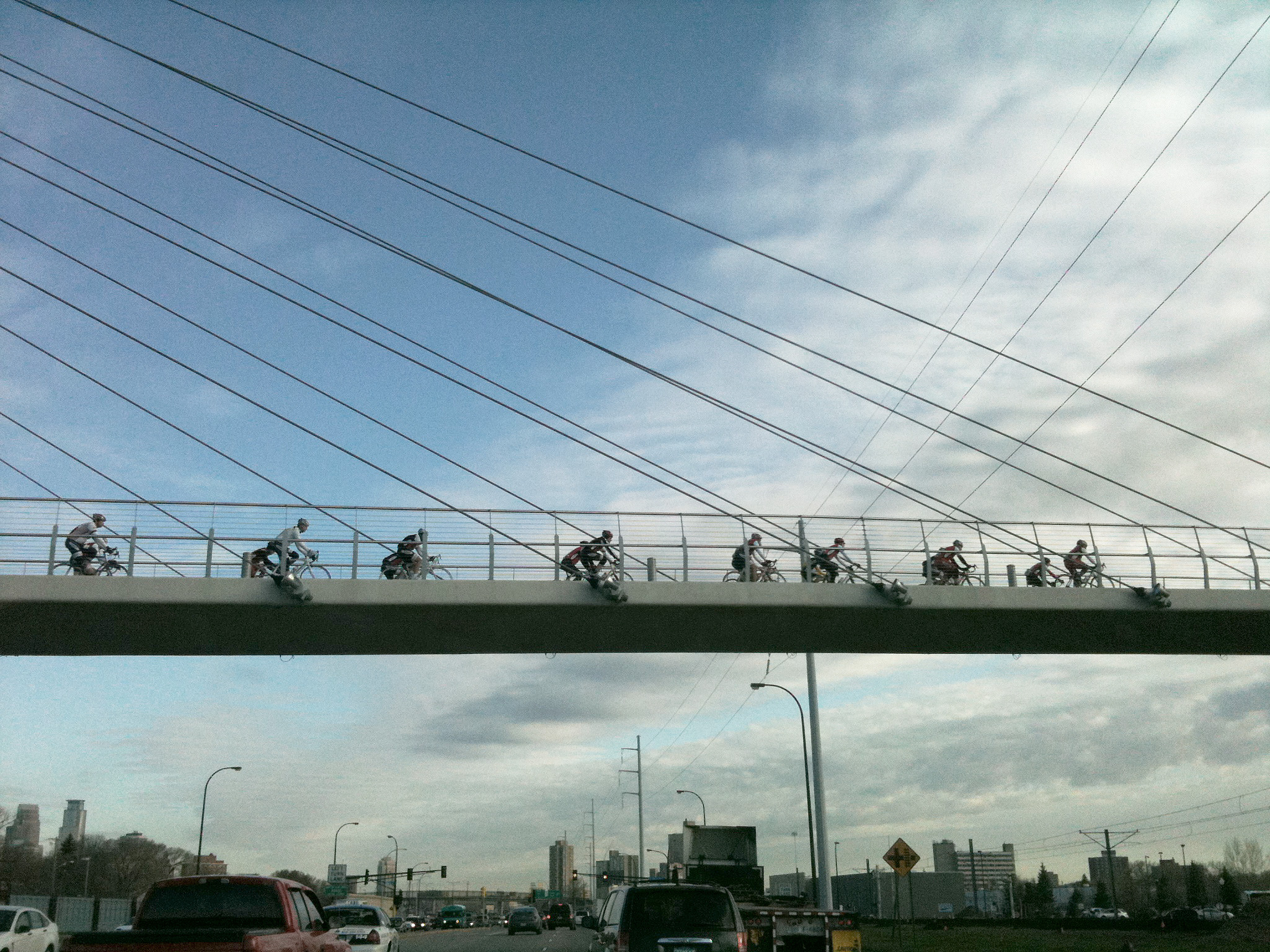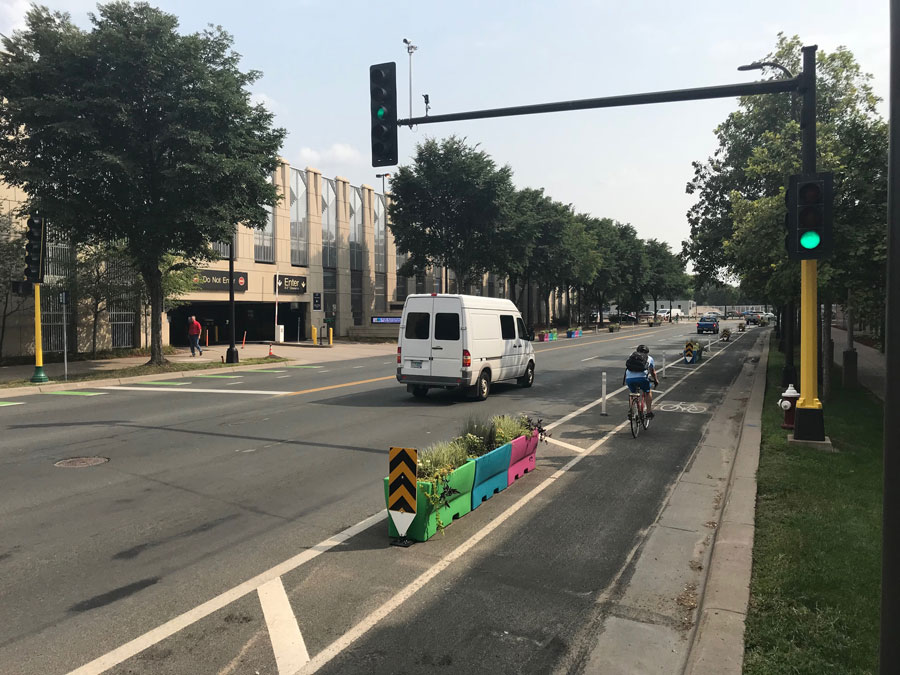Strategy 2 Build bikeway connections that overcome significant physical barriers during the buildout of the All Ages and Abilities Network.
The actions within this strategy are divided into two categories:
Action we will DOActions we will SUPPORTAction we will do are followed by “DO” and are colored in dark gray, and actions we will support are followed by “SUPPORT” and are colored in light gray.
Learn more about how we get thereBikeways work best in a connected network; the existing network will be added to and improved over the coming decade. The network is funneled into more focused corridors as major natural and manmade barriers are crossed, including rivers, railroads and highways. This strategy focuses on capitalizing on opportunities to partner with the Minnesota Department of Transportation, Hennepin County, Minneapolis Park and Recreation Board and others to ensure any crossing of a major barrier includes a high-quality facility for people traveling on bike or other micromobility vehicle, as well as for pedestrians. These opportunities are most obvious when a project is active, but the actions detailed here include efforts to retrofit existing bridges with facilities for increased safety and comfort for people biking and using micromobility options.
Like Walking Strategy 6, this strategy focuses, in part, on reconnecting neighborhoods that have been destroyed by freeway construction during the latter half of the 20th century. Reconnecting across barriers will help address the historic injustices these neighborhoods experienced and continue to experience due to the regional infrastructure.
Actions to build bikeway connections that overcome significant physical barriers during the buildout of the All Ages and Abilities Network.
Bicycling 2.1
Build protected bike lanes on existing motorized bridges over the Mississippi River, railroad corridors, freeways and expressways.
Supported goals:
Safety Equity Mobility
Related actions:
Walking 6.1, Walking 6.2, Walking 6.3, Walking 6.4, Walking 6.5
Difficulty:
High
Timeframe:
2028-2030 (Years 8-10)
Bicycling 2.2
Partner with the Minnesota Department of Transportation to build a new non-motorized bridge over I-94 between Lowry Avenue North and Dowling Avenue North, connecting North Minneapolis to the Mississippi River and helping to re-establish the community's connection to the waterfront that was severely limited by the construction of the interstate.
Supported goals:
Equity Mobility
Related actions:
Walking 6.1, Walking 6.2, Walking 6.3, Walking 6.4, Walking 6.5
Difficulty:
High
Timeframe:
2028-2030 (Years 8-10)
Bicycling 2.3
Consider planning and securing funds for new crossings of Regional Bicycle Barriers (as defined in the Metropolitan Council’s Transportation Policy Plan) as project development opportunities arise.
Supported goals:
Safety Equity Mobility
Related actions:
Difficulty:
Medium
Timeframe:
2028-2030 (Years 0-3)
Status:
On-going
Bicycling 2.4
Coordinate with Minneapolis Park and Recreation Board’s Neighborhood and Regional Park Capital Investment Projects to improve bikeway connections between parkway trails and City-owned bikeways.
Supported goals:
Equity Mobility Active Partnerships
Related actions:
Walking 7.7
Difficulty:
Low
Timeframe:
2020-2023 (Years 0-3)
Status:
On-going
Bicycling 2.5
Coordinate with the Minneapolis Parks and Recreation Board to evaluate converting one-way trail operations to two-way, particularly around Bde Maka Ska, Lake of the Isles and Lake Harriet, taking into consideration safety, additional impervious surface, tree impacts and stormwater management.
Supported goals:
Equity Mobility Active Partnerships
Related actions:
Difficulty:
High
Timeframe:
2020-2023 (Years 0-3)
Bicycling 2.6
Work with agency partners to evaluate opportunities to build new river crossings for the Midtown Greenway and Great Northern Greenway.
Supported goals:
Equity Mobility Active Partnerships
Related actions:
Walking 6.1, Walking 6.2, Walking 6.3, Walking 6.4, Walking 6.5
Difficulty:
High
Timeframe:
2028-2030 (Years 8-10)
See also actions:
- Street Operations 6.2
Advance the All Ages and Abilities Network through bridge maintenance and repair


